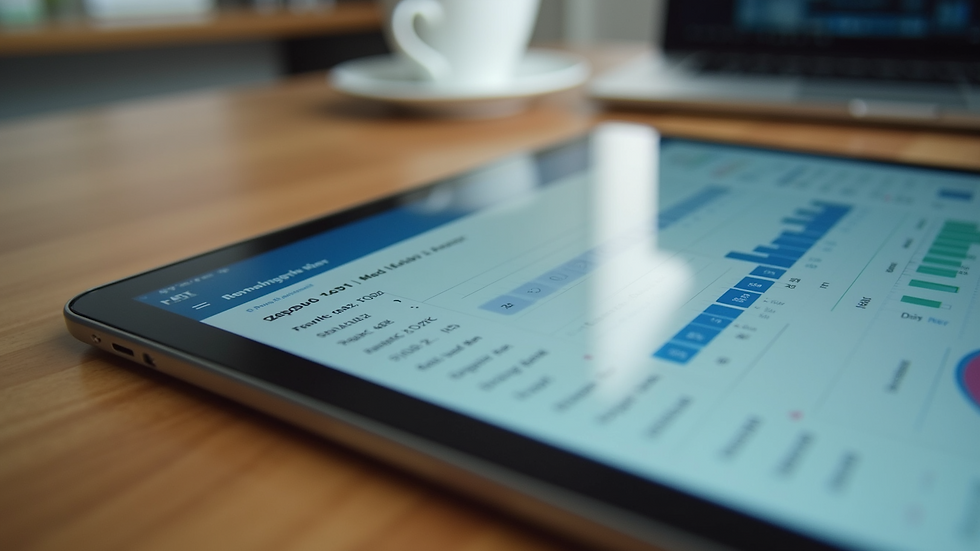Innovative Tools to Simplify Business Accounting
- Clark Falcon
- Aug 11, 2025
- 3 min read
Managing business finances can be complex and time-consuming. Fortunately, innovative accounting solutions have transformed how companies handle their bookkeeping and financial management. These tools automate routine tasks, reduce errors, and provide real-time insights into financial health. This article explores some of the most effective tools designed to simplify business accounting, helping you save time and make smarter financial decisions.
Why Modern Accounting Solutions Matter
Traditional accounting methods often involve manual data entry, spreadsheets, and piles of paperwork. These processes are not only inefficient but also prone to mistakes. Modern accounting solutions leverage technology to streamline these tasks, offering several benefits:
Automation: Automatically record transactions, generate invoices, and reconcile accounts.
Accuracy: Reduce human errors with built-in checks and validations.
Accessibility: Cloud-based platforms allow access from anywhere, anytime.
Real-time Reporting: Get instant financial reports to make informed decisions.
Integration: Connect with other business tools like payroll, inventory, and CRM systems.
By adopting these solutions, businesses can focus more on growth and less on administrative burdens.

Top Accounting Solutions to Consider
Choosing the right accounting tool depends on your business size, industry, and specific needs. Here are some innovative solutions that stand out:
1. Cloud-Based Accounting Software
Cloud accounting platforms like QuickBooks Online, Xero, and FreshBooks offer comprehensive features accessible via the internet. They provide:
Automated bank feeds to import transactions.
Invoice creation and payment tracking.
Expense management with receipt capture.
Collaboration with accountants in real-time.
These platforms are scalable and suitable for small to medium-sized businesses.
2. AI-Powered Bookkeeping Tools
Artificial intelligence is revolutionizing bookkeeping by automating data entry and categorization. Tools such as Botkeeper and Dext use AI to:
Extract data from receipts and invoices.
Categorize expenses based on historical patterns.
Detect anomalies and flag potential errors.
This reduces manual workload and improves accuracy.
3. Expense Management Apps
Managing employee expenses can be challenging. Apps like Expensify and SAP Concur simplify this by allowing employees to submit expenses via mobile devices. Features include:
Receipt scanning and automatic data extraction.
Policy compliance checks.
Integration with accounting software for seamless reimbursement.
4. Payroll and Tax Automation
Payroll processing and tax compliance are critical but complex tasks. Solutions like Gusto and ADP automate:
Employee salary calculations.
Tax withholdings and filings.
Benefits administration.
These tools ensure compliance and reduce the risk of penalties.
5. Financial Reporting and Analytics Tools
Understanding financial data is key to business success. Tools like Fathom HQ and Spotlight Reporting provide:
Customizable dashboards.
Trend analysis and forecasting.
KPI tracking.
They help businesses make data-driven decisions.

How to Choose the Best Accounting Solution
Selecting the right tool requires careful consideration. Here are some tips to guide your decision:
Assess Your Needs: Identify which accounting tasks consume the most time or cause errors.
Budget: Determine how much you can invest in software and ongoing subscriptions.
Ease of Use: Choose solutions with intuitive interfaces to minimize training time.
Integration: Ensure compatibility with existing business systems.
Customer Support: Reliable support can save time during implementation and troubleshooting.
Security: Verify that the platform uses strong encryption and data protection measures.
Testing free trials or demos can help you evaluate usability and features before committing.
Implementing Business Accounting Solutions Successfully
Adopting new accounting tools requires a strategic approach to maximize benefits:
Plan the Transition: Set clear goals and timelines for implementation.
Train Your Team: Provide adequate training to ensure smooth adoption.
Migrate Data Carefully: Transfer existing financial data accurately to avoid discrepancies.
Monitor Performance: Track how the new system improves efficiency and accuracy.
Seek Feedback: Encourage users to report issues or suggest improvements.
By following these steps, businesses can minimize disruptions and enhance financial management.

For businesses looking to upgrade their financial processes, exploring business accounting solutions can be a game-changer. These tools not only simplify bookkeeping but also provide valuable insights that drive growth.
Embracing the Future of Business Accounting
The landscape of business accounting is evolving rapidly. Embracing innovative tools is no longer optional but essential for staying competitive. Automation, AI, and cloud technologies are making accounting more accessible and efficient than ever before.
By investing in the right accounting solutions, businesses can:
Reduce operational costs.
Improve financial accuracy.
Enhance decision-making capabilities.
Free up time to focus on core activities.
Staying informed about the latest tools and trends will empower businesses to adapt and thrive in a dynamic market. Start exploring these innovative accounting solutions today to transform your financial management and unlock new opportunities.





Comments